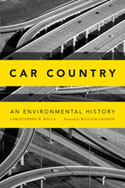
A Publication of Macalester’s Environmental Studies Department
September 2012
![]()
Letter From the Chair
Dear Friends of Environmental Studies,
Congratulations to the 17 ES graduates of 2012. These 17 students had a wide range of interests indicted by their graduating with 9 different emphases. The Biology and Geography emphasis were the most popular, with 5 and 4 students respectively. We also had our first student graduate with an interdisciplinary emphasis in Climate Science, a response to the addition of Louisa Bradtmiller to the department.
The Department was thrilled with the successful tenure review and promotion of Prof. Chris Wells, one of the founding members of the ES Department. As a member of the Candidate Review Committee, I can tell you that Macalester students and alumni had great praise for Prof. Wells’ role as a teacher-scholar. As one student wrote “His heart is truly in his work teaching reading, writing and sharing the insights that Environmental History has to offer. Keep him and many more students will graduate inspired, ready to confront the environmental challenges of this century …” Chris will be sabbatical for the calendar year 2013, partially funded by a grant from the Minnesota Arts and Cultural History Heritage Fund. I encourage all of you to get a copy of his new book Car Country: An Environmental History, 2012 from the University of Washington Press (www.washington.edu/uwpress/search/books/WELCAR.html).
We also had the great news the Louisa Bradtmiller successfully completed her pre-tenure review at Macalester and will be offered another 3-year contract, at the end of which she will be reviewed for tenure. Students and alumni praised her teaching. One student commented, “I can honestly say I have learned more useful material from her than from any other professor at Macalester … I wish every science student at Macalester had the opportunity to be mentored by someone so interested in and dedicated to helping them achieve.” Louisa continues her climate change research, supported by an NSF grant and includes Macalester students.
Prof. Roopali Phadke will be returning from sabbatical this fall and will be teaching Water and Power as a first-year course. She continues with her outstanding work on Wind Power Policy in conjunction  with Macalester students. Christie Manning continues to teach Environmental Classics and the Psychology of Sustainability. She also continues to work with students during the summer. This summer she had students supported by funds that came from the Margaret A. Cargill Foundation. The foundation provided endowment funding to the College to support programs related to the environment. The Provost has agreed to provide funding for two ES students to conduct student faculty research each summer. And as I mentioned in last year’s letter, Jerald Dosch has been appointed to be the Director of the Katharine Ordway Natural History Area. In his first year he coordinated a major coup for Ordway – the establishment of endowment support for the area through the sale of a conservation easement on most of the Ordway property. This easement not only protects the Ordway property from development, it provides on-going funding to help manage the property. In addition, Jerald, along with Prof. Ruthanne Kurth-Schai from the Education Studies Department, developed a new course – Outdoor Environmental Education. Much of this course took place at Ordway and was so successful, they’ll be offering it again this fall. We are also lucky to have Marianne Milligan again teach 100 Words for Snow: Language and Nature, a unique offering in an Environmental Studies program.
with Macalester students. Christie Manning continues to teach Environmental Classics and the Psychology of Sustainability. She also continues to work with students during the summer. This summer she had students supported by funds that came from the Margaret A. Cargill Foundation. The foundation provided endowment funding to the College to support programs related to the environment. The Provost has agreed to provide funding for two ES students to conduct student faculty research each summer. And as I mentioned in last year’s letter, Jerald Dosch has been appointed to be the Director of the Katharine Ordway Natural History Area. In his first year he coordinated a major coup for Ordway – the establishment of endowment support for the area through the sale of a conservation easement on most of the Ordway property. This easement not only protects the Ordway property from development, it provides on-going funding to help manage the property. In addition, Jerald, along with Prof. Ruthanne Kurth-Schai from the Education Studies Department, developed a new course – Outdoor Environmental Education. Much of this course took place at Ordway and was so successful, they’ll be offering it again this fall. We are also lucky to have Marianne Milligan again teach 100 Words for Snow: Language and Nature, a unique offering in an Environmental Studies program.
We have been fortunate to hire Ryan Edgington to teach courses in Environmental History for 2012-2013 to replace some of Chris Wells’ courses while Chris is on sabbatical. In addition to teaching American Environmental History, he will teach Food, Environment and Society in 20th Century America in the Fall and two new courses in the spring – one on global environmental history and the second on either “Atomic America” or western environmental history. Ryan’s job talk “Lines in the Sand: The Environmental Contest for White Sands Missile Range, New Mexico” was well received by students and faculty. We’re lucky to have such an experienced and inspirational teacher-scholar to join us this year.
Graduating seniors, Elspeth Cavert and Rosie Mate were acknowledged by the department for their contributions to the department over their 4 years at Macalester. Elspeth was awarded the Environmental Studies Scholarship Award. Elspeth, from Minneapolis, was an ES and Political Science double major. She interned with the Environmental Initiative and assisted them with research on air quality legislation for Minnesota. Elspeth is planning to do a yearlong volunteer program through Lutheran Volunteer Corps starting this fall. Rosie Mate was awarded the Environmental Studies Citizenship Award. Rosie, from Champaign-Urbana, IL, was a double major in Economics and ES. Besides her work at the Clean Energy Resources Team and the completion of an honors project “Climbing the Clean Energy Pyramid: A Study of the Hierarchical Structure and Interdependency of Residential Energy Efficiency Actions”, Rosie spearheaded a project funded by the Sustainability Office to replace all campus faucet aerators with low-flow models to cut sink water usage by half on campus. Rosie has been hired by an economic consulting firm called Analysis Group, and she’ll be working as an economic analyst in their office in Denver which house’s the firms environmental and energy specialists.
Many of you may notice the new look of the Environmental Studies website and a change in its content. The College is in the process of moving to a new website model and our own Ann Esson has been involved deeply in this process. She has done a great job for both the College and the ES Department. Thanks Ann!
I invite all of you to take a look at our assessment report from 2011-2012 . The report includes the results of our senior survey and some ideas for how we might improve our curriculum. I encourage any of you to submit ideas for improving our program in the future based on you experiences at Mac and in “the real world.” Our mission statement and rationale states: “Environmental Studies is an interdisciplinary program based on a holistic understanding of environmental issues occurring at the local, national, and global level. The program offers students tools and perspectives from the humanities, natural sciences, and social sciences to understand the causes and consequences of environmental problems and the knowledge to develop potential solutions.” You can find out more about our rationale for the major requirements here. Our most recent information from the registrar indicates we will be starting the fall with 41 ES majors up a few from last year (36). We look forward to working with another great group of Macalester students!
Dan Hornbach
Chair, Environmental Studies
![]()
Prof. Chris Wells Receives Tenure
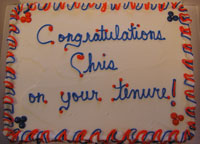 Congratulations to Prof. Chris Wells who has received tenure. Chris started in the Environmental Studies Department in 2005 and teaches the following courses: American Environmental History, Consumer Nation: American Consumer Culture in the 29th Century, Three Rivers Environmental History, Environmental Justice, U.S. Urban Environmental History, Imperial Nature: The United States and the Global Environment, and Car Country: The Automobile and the American Environment. Chris will be on sabbatical Spring 2013 and Fall 2013. Read more here.
Congratulations to Prof. Chris Wells who has received tenure. Chris started in the Environmental Studies Department in 2005 and teaches the following courses: American Environmental History, Consumer Nation: American Consumer Culture in the 29th Century, Three Rivers Environmental History, Environmental Justice, U.S. Urban Environmental History, Imperial Nature: The United States and the Global Environment, and Car Country: The Automobile and the American Environment. Chris will be on sabbatical Spring 2013 and Fall 2013. Read more here.
![]()
Senior Graduation Pledge
 This year 57 Macalester 2012 graduates signed the Senior Graduation Pledge and wore green ribbons at this year’s commencement ceremonies, thanks to the work of ES senior Diego Ruiz. The graduation pledge states, “I pledge to explore and take into account the social and environmental consequences of any job I consider or any organization for which I work.”
This year 57 Macalester 2012 graduates signed the Senior Graduation Pledge and wore green ribbons at this year’s commencement ceremonies, thanks to the work of ES senior Diego Ruiz. The graduation pledge states, “I pledge to explore and take into account the social and environmental consequences of any job I consider or any organization for which I work.”
This idea first started at Manchester College, Indiana, in 1988. For some students, searching for a job means searching for companies or organizations that do not pollute streams, rivers, or the air; practice discriminatory or unfair business; or create an unfriendly work atmosphere. These students conscientiously go the extra mile in their job searches because they support this nation-wide effort.
Taking the pledge is voluntary; students determine for themselves what they consider to be socially and environmentally responsible.
![]()
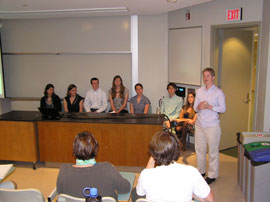 |
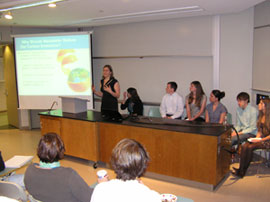 |
EnviroThursdays
There were 20 EnviroThursday presentations during the 2011-12 school with with over 560 in attendance.
- “Are Parks Working? A Case Study of Bannerghatta National Park in India” by Sanchayeeta Adhikari, Berg Postdoctoral Fellow, Macalester Geography Dept.
- “Investigating the Natural Occurrence of Arsenic in Groundwater: Where is It? How Did it Get There? Is My Well Water Safe to Drink?” by Dr. Beth O’Shea, University of San Diego
- “Master of Landscape Architecture at Washington University in St. Louis”by Natalie Yates, Assistant Professor of Landscape Architecture, Graduate School of Architecture & Urban Design at Washington University in St. Louis
- “Trends and Sustainable Building Practices in Europe”by Rene Sigg, Managing Partner, Intep, Zurich, Switzerland, and Mark Dickinson, Director of Macalester Facilities Services
- “Resource Challenges Facing a Sovereign Nation of Lake Superior”by Cyrus Hester, Environmental Specialist, Bad River Band of Lake Superior Chippewa
- “Ecopreneuring: A Story of Turning a Passion into a Livelihood” by Krista Leraas, Co-owner of Harvest Moon Backyard Farmers
- “Ideals to Action: Environmental Values and College Culture” by Jim Farrell, Professor of History, American Studies, Environmental Studies and American Conversations, St. Olaf College
- “Volunteering with the Peace Corps” – Moderator: Janice McInerney (Ukraine, 2002-2004)
Panelists: Randee Edmundson (Tanzania, 2007-2009), Paul Karlson (Poland, 1996-1998), Nicole Menard (Madagascar, 2000-2002), Shannon Skally (Morocco, 1996-1998) - “EcoBucks and the Gender of ‘Green'” by Evangeline Heiliger, Mellon Postdoctoral Fellow and Visiting Assistant Professor of Gender Studies, Coe College
- “Delisting of the Gray Wolf” by L. David Mech, University of Minnesota
- “Are Cars Obsolete? The Future of Sustainable Transportation” by Kjensmo Walker, Chairperson of Citizens for Personal Rapid Transit (CPRT)
- “Macalester’s EcoHouse” by EcoHouse Residents Camille Erickson, Nick Matzke, Lisa Goese, and Leah Plummer
- “The Education of Barack Obama: Race and Politics in the Age of Fracture” by Thomas Sugrue, David Boies Professor of History and Sociology at the University of Pennsylvania
- “Putting the Fun Back in Infrastructure: The Electric System and the Future of Energy”
Speaker: Maggie Koerth-Baker, Science Editor for the website boingboing.net - “Nanda-gikein Naawij Gaa-izhiwebakin Manoomini-zndaasowaaga’iganiing: The Past, Present, and Future of Wild Rice Lakes” by Dr. Amy Myrbo, Research Associate and Lab Manager, LacCore / Limnological Research Center, University of Minnesota
- “Lines in the Sand: The Environmental Contest for White Sands Missile Range, New Mexico” by Ryan Edgington, Visiting Environmental History Professor Candidate
- “Collaborating for Change: Macalester’s Sustainability Student Network” by Representatives from Macalester’s Sustainability Network
- “Global Threats, Global Futures: Learning to Live with Declining Living Standards” by Thayer Scudder, Anthropology Professor Emeritus at the California Institute of Technology
- “Climbing the Clean Energy Pyramid: A Study of the Hierarchical Structure and Interdependency of Residential Energy Efficiency Actions” by Rose Mate ’12, Honors Thesis Presentation
- “Carbon Neutrality at Mac: Taking a New Look at the Big Picture” by Environmental Studies Senior Seminar Students
You can read more about these presentations at www.macalester.edu/academics/environmentalstudies/envirothursday and click on the Fall 2011 and Spring 2012 links. EnviroThursdays take place every Thursday during the school year in Olin-Rice 250 at 12 noon.
![]()
Environmental Studies Faculty News
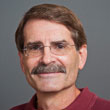 Prof. Dan Hornbach, Chair
Prof. Dan Hornbach, Chair
The past year has been a rewarding one for Dan. He chaired the ES department and the College’s Resources and Planning Committee (a committee that works with the administration to consider how best to use the College’s resources in a way that will insure the best education for out students). He taught Aquatic Ecology in the Fall and Environmental Science in the spring. During the summer, Dan worked with students Jenny Liu, Diane Rubin and Forest Schenck examining the impacts of a small dam on mussel communities in a tributary of the St. Croix River, the Sunrise River. They had a great summer and got some interesting data. The students will be presenting the results of their research at the St. Croix River Research Rendezvous hosted by the Science Museum of Minnesota in October.
DanI also began a research project with the EREN network. The Ecological Research Education Network is an NSF funded network with a mission to create a model for collaborative ecological research that generates high-quality, publishable data involving undergraduate students and faculty at primarily undergraduate institutions (PUIs). The project he is working on examines the impact of riparian vegetation on stream temperature. Temperature variation across ecosystems can be assessed at various spatial and temporal scales. These variations in spatiotemporal patterns can be found in terrestrial and aquatic systems and significantly influence ecosystem functions and structure. Our project examines the effect of riparian shade on the temperature regime of streams (1-3 order) at eleven locations across the United States and Canada. He is working at Valley Creek near Afton, MN, at the Belwin Conservancy. The data they have collected so far was presented as a poster at the Ecological Society of America meetings in August. They hope to collect more data and publish their results in the next year. Dan also hopes to integrate some of this work into his Aquatic Ecology class.
On a personal note, Dan’s second grandchild was born on December 30, 2011 – Daniel Sean! This was a great event for his family. Will he be in the Mac class of 2034?
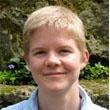 Prof. Louisa Bradtmiller
Prof. Louisa Bradtmiller
Louisa had fun teaching Climate and Society as a first year course last fall. In addition to the usual climate science courses, she taught the senior seminar for the third time, focusing on the possibilities for Macalester to invest in renewable sources of energy for the campus. In February, Louisa participated in Climate Science Day on Capitol Hill; organized by several scientific organizations, this event provided a chance for scientists to meet face-to-face with lawmakers to talk about climate change. It was an extremely interesting and generally positive experience. Over the summer, Louisa worked with two students doing lab work on an NSF-funded project examining changes in biological productivity off the northwest African coast over the past 20,000 years.
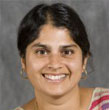 Prof. Roopali Phadke
Prof. Roopali Phadke
Roopali was on sabbatical last year working on her NSF funded project titled “Landscapes of Power”. This project develops landscape symposia in different regions to better understand the kinds of wind energy development that rural communities support. She also spent part of her sabbatical time traveling through India and Italy with her family catching up with old research contacts and making new ones. Last summer her research group, including Prof. Christie Manning and three ES students, worked in Massachusetts. Prof. Manning and Prof. Phadke also submitted a grant to the National Science Foundation to begin a new research project examining climate adaptation in partnership with the City of Saint Paul and the Science Museum of Minnesota.
In the 2012-13 academic year, Roopali will be teaching five courses. In the Fall, she is teaching the department’s first year course called “Water and Power”. She is also teaching the Environmental Leadership Practicum and Seminar. In the Spring, she will be teaching Sustainable Development, Citizen Science and her intro course Environmental Politics and Policy.
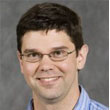 Prof. Chris Wells
Prof. Chris Wells
This year was a busy and rewarding one for Chris. In addition to receiving tenure last November (hooray!), he taught a full slate of courses, including one exciting new course, Environmental Justice. He also remained active in various campus activities, including advising the EcoHouse and teaching one of the pilot sections of the Supplementary Writers’ Workshop. On the scholarly front, he published articles in the Journal of American History and the Journal of Planning History, and is excitedly waiting for the publication of his book, Car Country: An Environmental History, which is scheduled for release in early December. Over the summer, along with his collaborator George Vrtis (Carleton) and with support from the Minnesota Arts and Cultural History Heritage Fund, he helped bring more than a dozen scholars together from across the country for a conference on the environmental history of Minnesota. Together with Prof. Vrtis, he is now busy helping edit a volume of scholarship on that subject. This semester, he is continuing to work on writing reform at Macalester while teaching Imperial Nature: The US and the Global Environment, and will go on sabbatical in the spring.
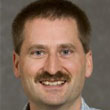 Prof. Jerald Dosch
Prof. Jerald Dosch
Jerald continued in his role as the director of the Katharine Ordway Natural History Area in a year marked by great progress and expansion. The past academic year included a prescribed burn (www.macalester.edu/news/2012/07/ordway-burn) and the start of a major prairie restoration project. This year marks the 45th anniversary of Macalester establishing the Ordway Field Station and the permanent protection of most of Ordway through a conservation easement on the land in cooperation with Dakota County and the Friends of the Mississippi River (www.macalester.edu/news/2012/07/macalester-permanently-protects-open-space-along-the-mississippi-river). During the 2012-13 academic year Jerald will co-teach the very popular new Outdoor Environmental Education course with Ruthanne Kurth-Schai as well as Ecology and Environmental Science.
Prof. Ryan Edgington
Ryan Edgington joins the Environmental Studies Department as a visiting assistant professor after teaching at Central Michigan University this past year. Last year was a fruitful one. Ryan’s first book, Range Wars: The Environmental Contest for White Sands Missile Range (University of Nebraska Press, 2014) was moved into production. Ryan also finished two articles, “Lives Under the Canopy: Spotted Owls and Loggers in Western Forests,” Natural Resources Journal (co-authored with Erik Loomis, Department of History, University of Rhode Island), and “An ‘All-Seeing Flying Eye’: V-2 Rockets and the Promises of Earth Photography,” History and Technology. Both are forthcoming. In April Ryan co-organized a conference at Temple University titled “Imagining Cold War Environments.” During the fall semester, he is teaching American Environmental History and Food, Environment, and Society in 20th Century America.
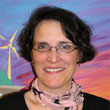 Prof. Christie Manning
Prof. Christie Manning
Christie had an extremely full teaching load in 2011-2012. In addition to her usual courses, Environmental Classics (in Fall and Spring) and Psychology of Sustainable Behavior, she taught the Environmental Leadership Practicum (covering for Roopali while on sabbatical) and a new course, “Psychology in the Material World”, which examined the impacts of consumerism from an environmental and psychological perspective. Between Spring and Fall semester, Christie also led a group of 20 students from Macalester and St. Thomas on a 3-week J-term course trip in Germany, studying Conservation Psychology. Finally, in the Spring she was asked by the Psychology Department to take on an extra course, Research in Psychology II, to cover for a professor who became ill mid-way through term. This academic year, 2012-2013, Christie is cutting back to just two courses: Psychology of Sustainable Behavior in the Fall and Environmental Classics in the Spring. What will she do with all her free time?
Christie spent much of the summer working on her research. In August, with the help of two psychology students, Kelly Cargos and Paul Rebman, she completed a set of three experiments using new measures – eye-tracking and implicit associations. These studies tested the hypothesis that the psychological distance people feel toward climate change can be mitigated through a more proximal framing of the issue (e.g., describing climate change in terms of its effects on Minnesota, rather than effects on polar bears). Christie plans to submit their results to the journal Social Cognition. Christie ended the summer with her usual “fun” at the State Fair. On Saturday, September 1, with the help of 20 students, she and her colleagues from St. Thomas collected more than 1,000 research surveys. It looks like her free time this semester will be spent doing data analysis.
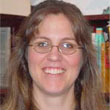 Prof. Marianne Milligan
Prof. Marianne Milligan
During the academic year 2011-2012, Marianne taught Endangered and
Minority Languages and Sociolinguistics for the Linguistics Department. During the current academic year, she will be teaching 100 Words for Snow: Language and Nature as well as two classes in the Linguistics Department. She continues work on the dictionaries of the Menominee language, an Algonquian language spoken in Wisconsin. Over the summer she started a project looking at the claims that speakers of Native American languages like Menominee talk about nature in more holistic ways in part because of the structure of the languages.
